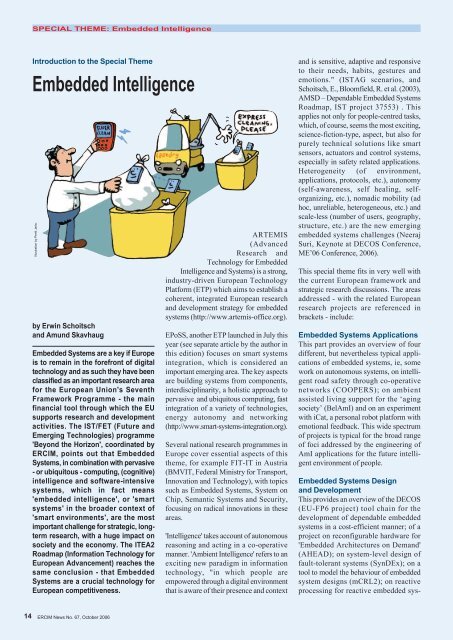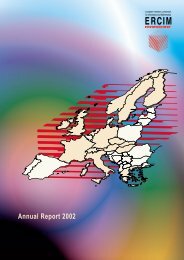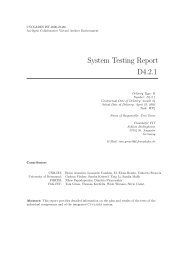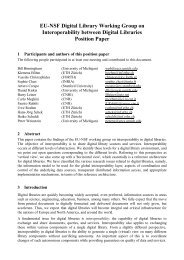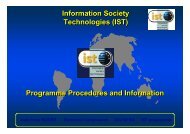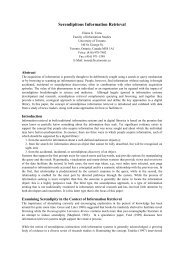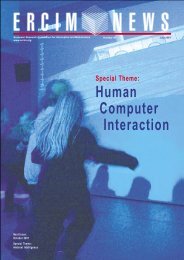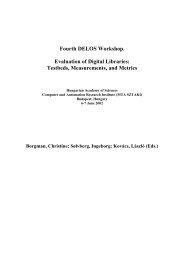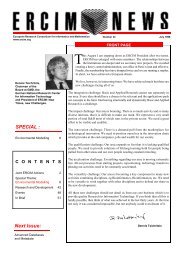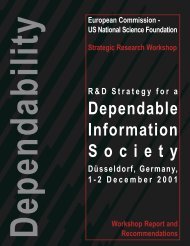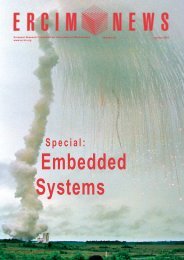Towards a Platform for Widespread Embedded Intelligence - ERCIM
Towards a Platform for Widespread Embedded Intelligence - ERCIM
Towards a Platform for Widespread Embedded Intelligence - ERCIM
You also want an ePaper? Increase the reach of your titles
YUMPU automatically turns print PDFs into web optimized ePapers that Google loves.
14<br />
SPECIAL THEME: <strong>Embedded</strong> <strong>Intelligence</strong><br />
Introduction to the Special Theme<br />
<strong>Embedded</strong> <strong>Intelligence</strong><br />
Illustration by Pertti Jarla.<br />
by Erwin Schoitsch<br />
and Amund Skavhaug<br />
<strong>Embedded</strong> Systems are a key if Europe<br />
is to remain in the <strong>for</strong>efront of digital<br />
technology and as such they have been<br />
classified as an important research area<br />
<strong>for</strong> the European Union's Seventh<br />
Framework Programme - the main<br />
financial tool through which the EU<br />
supports research and development<br />
activities. The IST/FET (Future and<br />
Emerging Technologies) programme<br />
'Beyond the Horizon', coordinated by<br />
<strong>ERCIM</strong>, points out that <strong>Embedded</strong><br />
Systems, in combination with pervasive<br />
- or ubiquitous - computing, (cognitive)<br />
intelligence and software-intensive<br />
systems, which in fact means<br />
'embedded intelligence', or 'smart<br />
systems' in the broader context of<br />
'smart environments', are the most<br />
important challenge <strong>for</strong> strategic, longterm<br />
research, with a huge impact on<br />
society and the economy. The ITEA2<br />
Roadmap (In<strong>for</strong>mation Technology <strong>for</strong><br />
European Advancement) reaches the<br />
same conclusion - that <strong>Embedded</strong><br />
Systems are a crucial technology <strong>for</strong><br />
European competitiveness.<br />
<strong>ERCIM</strong> News No. 67, October 2006<br />
ARTEMIS<br />
(Advanced<br />
Research and<br />
Technology <strong>for</strong> <strong>Embedded</strong><br />
<strong>Intelligence</strong> and Systems) is a strong,<br />
industry-driven European Technology<br />
<strong>Plat<strong>for</strong>m</strong> (ETP) which aims to establish a<br />
coherent, integrated European research<br />
and development strategy <strong>for</strong> embedded<br />
systems (http://www.artemis-office.org).<br />
EPoSS, another ETP launched in July this<br />
year (see separate article by the author in<br />
this edition) focuses on smart systems<br />
integration, which is considered an<br />
important emerging area. The key aspects<br />
are building systems from components,<br />
interdisciplinarity, a holistic approach to<br />
pervasive and ubiquitous computing, fast<br />
integration of a variety of technologies,<br />
energy autonomy and networking<br />
(http://www.smart-systems-integration.org).<br />
Several national research programmes in<br />
Europe cover essential aspects of this<br />
theme, <strong>for</strong> example FIT-IT in Austria<br />
(BMVIT, Federal Ministry <strong>for</strong> Transport,<br />
Innovation and Technology), with topics<br />
such as <strong>Embedded</strong> Systems, System on<br />
Chip, Semantic Systems and Security,<br />
focusing on radical innovations in these<br />
areas.<br />
'<strong>Intelligence</strong>' takes account of autonomous<br />
reasoning and acting in a co-operative<br />
manner. 'Ambient <strong>Intelligence</strong>' refers to an<br />
exciting new paradigm in in<strong>for</strong>mation<br />
technology, "in which people are<br />
empowered through a digital environment<br />
that is aware of their presence and context<br />
and is sensitive, adaptive and responsive<br />
to their needs, habits, gestures and<br />
emotions." (ISTAG scenarios, and<br />
Schoitsch, E., Bloomfield, R. et al. (2003),<br />
AMSD – Dependable <strong>Embedded</strong> Systems<br />
Roadmap, IST project 37553) . This<br />
applies not only <strong>for</strong> people-centred tasks,<br />
which, of course, seems the most exciting,<br />
science-fiction-type, aspect, but also <strong>for</strong><br />
purely technical solutions like smart<br />
sensors, actuators and control systems,<br />
especially in safety related applications.<br />
Heterogeneity (of environment,<br />
applications, protocols, etc.), autonomy<br />
(self-awareness, self healing, sel<strong>for</strong>ganizing,<br />
etc.), nomadic mobility (ad<br />
hoc, unreliable, heterogeneous, etc.) and<br />
scale-less (number of users, geography,<br />
structure, etc.) are the new emerging<br />
embedded systems challenges (Neeraj<br />
Suri, Keynote at DECOS Conference,<br />
ME’06 Conference, 2006).<br />
This special theme fits in very well with<br />
the current European framework and<br />
strategic research discussions. The areas<br />
addressed - with the related European<br />
research projects are referenced in<br />
brackets - include:<br />
<strong>Embedded</strong> Systems Applications<br />
This part provides an overview of four<br />
different, but nevertheless typical applications<br />
of embedded systems, ie, some<br />
work on autonomous systems, on intelligent<br />
road safety through co-operative<br />
networks (COOPERS); on ambient<br />
assisted living support <strong>for</strong> the ‘aging<br />
society’ (BelAmI) and on an experiment<br />
with iCat, a personal robot plat<strong>for</strong>m with<br />
emotional feedback. This wide spectrum<br />
of projects is typical <strong>for</strong> the broad range<br />
of foci addressed by the engineering of<br />
AmI applications <strong>for</strong> the future intelligent<br />
environment of people.<br />
<strong>Embedded</strong> Systems Design<br />
and Development<br />
This provides an overview of the DECOS<br />
(EU-FP6 project) tool chain <strong>for</strong> the<br />
development of dependable embedded<br />
systems in a cost-efficient manner; of a<br />
project on reconfigurable hardware <strong>for</strong><br />
'<strong>Embedded</strong> Architectures on Demand'<br />
(AHEAD); on system-level design of<br />
fault-tolerant systems (SynDEx); on a<br />
tool to model the behaviour of embedded<br />
system designs (mCRL2); on reactive<br />
processing <strong>for</strong> reactive embedded sys


